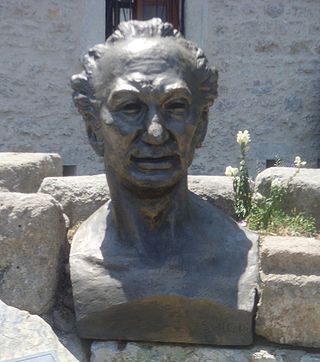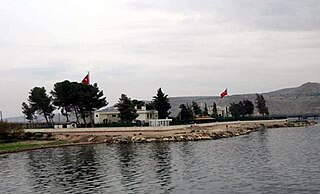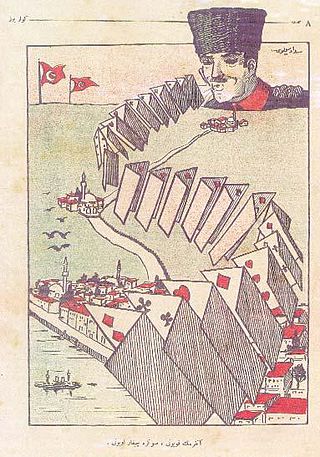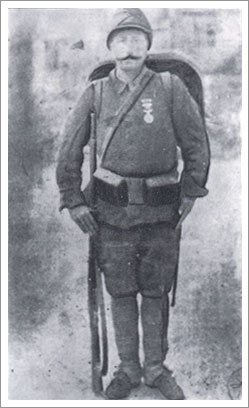Related Research Articles

Ferit Orhan Pamuk is a Turkish novelist, screenwriter, academic, and recipient of the 2006 Nobel Prize in Literature. One of Turkey's most prominent novelists, he has sold over 13 million books in 63 languages, making him the country's best-selling writer.
Murat Belge is a Turkish academic, translator, literary critic, columnist, civil rights activist, and occasional tour guide.

Cevat Şakir Kabaağaçlı was a Cretan Turkish writer of novels, short-stories and essays, as well as a keen ethnographer and travel writer.

The Remaining Documents of Talaat Pasha, also known in Turkey as The Abandoned Documents of Talaat Pasha and Talaat Pasha's Black Book, is the title of a 2008 book by the Turkish journalist Murat Bardakçı. It reproduces in modern Turkish script a selection of documents from the WWI period by Mehmed Talaat Pasha, the Ottoman Empire's Grand Vizier and Minister of Interior, that deal with the relocations of both Muslim Turks and Armenians and the expropriation of abandoned Armenian and Greek property. Its full English title is The Remaining Documents of Talaat Pasha: Documents and Important Correspondence Found in the Private Archives of Sadrazam Talaat Pasha about the Armenian Deportations.
Syrian Turkmen are Syrian citizens of Turkish origin who mainly trace their roots to Anatolia. Turkish-speaking Syrian Turkmen make up the third largest ethnic group in the country, after the Arabs and Kurds respectively.
Yalçın Küçük is a Turkish socialist writer, economist, historian and media pundit, recognized for his historical studies on the late-Ottoman and Republican periods in the history of Turkey and Soviet economic development from a Marxist perspective and also his interest in crypto-Judaism in Turkey (Sabbateanism) and criticism of the Justice and Development Party.

The Tomb of Suleyman Shah is, according to Ottoman tradition, the grave housing the relics of Suleyman Shah, grandfather of Osman I, the founder of the Ottoman Empire. This legendary tomb has since 1236 had three locations, all in present-day Syria.

Fatma Aliye Topuz, often known simply as Fatma Aliye or Fatma Aliye Hanım, was a Turkish novelist, columnist, essayist, women's rights activist and humanitarian. Although there was an earlier published novel by the Turkish female author Zafer Hanım in 1877, since that one remained her only novel, Fatma Aliye Hanım with her five novels is credited by literary circles as the first female novelist in Turkish literature and the Islamic world.
The Freedom and Accord Party was a liberal Ottoman political party active between 1911 and 1913, during the Second Constitutional Era. It was the most significant opposition to Union and Progress in the Chamber of Deputies. The political programme of the party advocated for Ottomanism, government decentralisation, the rights of ethnic minorities, and close relations with Britain. In the post-1918 Ottoman Empire, the party became known for its attempts to suppress and prosecute the CUP.
The Eighth Army of the Ottoman Empire was one of the field armies of the Ottoman Army. It was established during World War I.

Safranbolulu Izzet Mehmet Pasha was a grand vizier of the Ottoman Empire and served from 1794 to 1798.

Sedat Simavi was a Turkish journalist, writer and film director. He established many newspapers and magazines.

The TGC Press Media Museum, aka Istanbul Press Media Museum, is a history and technology museum dedicated to mass communication in Turkey featuring exhibitions about journalism. It is located in the Çemberlitaş neighborhood of Fatih district in İstanbul, Turkey. Established in 1988, it is owned and operated by the Journalists Association of Turkey.
Şükûfe Nihal Başar was a Turkish educator, poet and activist, who took part in women's liberation movements during Turkey's nation building process.

Bigalı Mehmet Çavuş, was an Ottoman Army sergeant, who fought during the Gallipoli Campaign of World War I. He is remembered as a hero, and is considered to be the eponym of the common name "Mehmetçik" used for a Turkish soldier.
There were multiple newspapers published in the Ottoman Empire.

Ahmet Cevat Emre (1876–1961) was a Turkish journalist and linguist. He was a member of the Turkish Language Association (TDK) and involved in the latinization of the Turkish alphabet. He also served as a deputy for Çanakkale in the Grand National Assembly of Turkey.
Ahmet Cevdet Oran was a Turkish journalist who founded an influential newspaper, İkdam which was in circulation between 1894 and 1928. He was one of the early Turkish journalists who employed pure Turkish instead of Ottoman Turkish in his writings.

Turkish Argentines are Argentine citizens of full or partial Turkish ancestry. In 2015, The International Organization for Migration (IOM) estimated that there are 635 Turkish immigrants residing in Argentina.
Cevat is a given name. Notable people with the name include:
References
- ↑ Erguner, Kudsi (2005), Journeys of a Sufi Musician , Saqi Books, p. 27, ISBN 0863565476
- ↑ Hurriyet (2008), 'Deli değil, zırdeliymiş!', Hurriyet, retrieved 2 January 2017
- ↑ Oruç, Sema (2015), "Refi Cevat Ulunay'ın Romanlarında Aşk ve Cinsellik", Journal of Turkish Language and Literature, 1 (2): 109–114